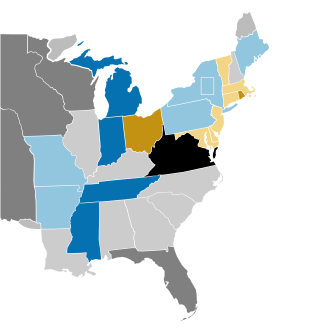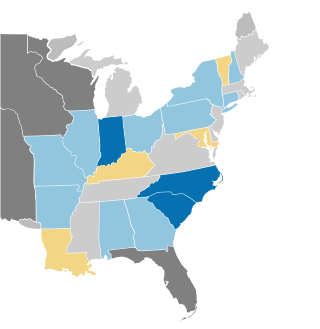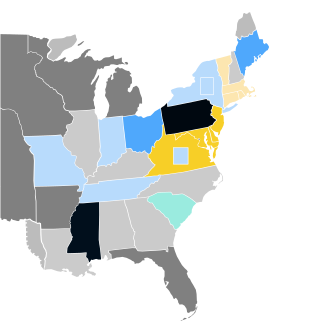
The 1848–49 United States Senate elections were held on various dates in various states. As these U.S. Senate elections were prior to the ratification of the Seventeenth Amendment in 1913, senators were chosen by state legislatures. Senators were elected over a wide range of time throughout 1848 and 1849, and a seat may have been filled months late or remained vacant due to legislative deadlock. In these elections, terms were up for the senators in Class 3.

The 1856–57 United States Senate elections were held on various dates in various states. As these U.S. Senate elections were prior to the ratification of the Seventeenth Amendment in 1913, senators were chosen by state legislatures. Senators were elected over a wide range of time throughout 1856 and 1857, and a seat may have been filled months late or remained vacant due to legislative deadlock. In these elections, terms were up for the senators in Class 1.

The 1876–77 United States Senate elections were held on various dates in various states, coinciding with Rutherford B. Hayes's narrow election as president. As these U.S. Senate elections were prior to the ratification of the Seventeenth Amendment in 1913, senators were chosen by state legislatures. Senators were elected over a wide range of time throughout 1876 and 1877, and a seat may have been filled months late or remained vacant due to legislative deadlock. In these elections, terms were up for the senators in Class 2.

The 1900–01 United States Senate elections were held on various dates in various states, coinciding with President William McKinley's re-election as well as the 1900 House of Representatives elections. As these U.S. Senate elections were prior to the ratification of the Seventeenth Amendment in 1913, senators were chosen by state legislatures. Senators were elected over a wide range of time throughout 1900 and 1901, and a seat may have been filled months late or remained vacant due to legislative deadlock. In these elections, terms were up for the senators in Class 2.

The 1844–45 United States Senate elections were held on various dates in various states, coinciding with James K. Polk's election. As these U.S. Senate elections were prior to the ratification of the Seventeenth Amendment in 1913, senators were chosen by state legislatures. Senators were elected over a wide range of time throughout 1844 and 1845, and a seat may have been filled months late or remained vacant due to legislative deadlock. In these elections, terms were up for the senators in Class 1.

The 1842–43 United States Senate elections were held on various dates in various states. As these U.S. Senate elections were prior to the ratification of the Seventeenth Amendment in 1913, senators were chosen by state legislatures. Senators were elected over a wide range of time throughout 1842 and 1843, and a seat may have been filled months late or remained vacant due to legislative deadlock. In these elections, terms were up for the senators in Class 3.

The 1832–33 United States Senate elections were held on various dates in various states. As these U.S. Senate elections were prior to the ratification of the Seventeenth Amendment in 1913, senators were chosen by state legislatures. Senators were elected over a wide range of time throughout 1832 and 1833, and a seat may have been filled months late or remained vacant due to legislative deadlock. In these elections, terms were up for the senators in Class 1.

The 1794 United States Senate special election in Pennsylvania was held on March 31, 1794. James Ross was elected by the Pennsylvania General Assembly to the United States Senate.

The 1831 United States Senate special election in Pennsylvania was held on December 13, 1831. George M. Dallas was elected by the Pennsylvania General Assembly to the United States Senate.

The 1845 United States Senate election in Pennsylvania was held on January 14, 1845. Incumbent Daniel Sturgeon was re-elected by the Pennsylvania General Assembly to the United States Senate.

The 1861 United States Senate special election in Pennsylvania was held on March 14, 1861. David Wilmot was elected by the Pennsylvania General Assembly to the United States Senate.

The 1901 United States Senate special election in Pennsylvania was held on January 15, 1901, after the regularly scheduled legislative election in January—April 1899 failed to elect a Senator. Former Senator Matthew Quay, who had left the Senate for nearly two years because of the political stalemate, was again elected by the Pennsylvania General Assembly to the United States Senate.

The 1801 United States Senate special election in Pennsylvania was held on December 17, 1801. George Logan was elected by the Pennsylvania General Assembly to the United States Senate.

The 1806 United States Senate election in Pennsylvania was held from December 9 to 16, 1806. Andrew Gregg was elected by the Pennsylvania General Assembly to the United States Senate.

The 1834 United States Senate special election in Pennsylvania was held on December 6, 1834. Future President of the United States James Buchanan was elected by the Pennsylvania General Assembly to the United States Senate.

The 1836 United States Senate election in Pennsylvania was held on December 14, 1836. Future President of the United States James Buchanan was re-elected by the Pennsylvania General Assembly to the United States Senate.

The 1843 United States Senate election in Pennsylvania was held on January 10, 1843. Future President of the United States James Buchanan was re-elected by the Pennsylvania General Assembly to the United States Senate.

The 1849 United States Senate election in Pennsylvania was held on January 10, 1849. James Cooper was elected by the Pennsylvania General Assembly to the United States Senate.

The 1856 United States Senate election in Pennsylvania was held on January 14, 1856. William Bigler was elected by the Pennsylvania General Assembly to the United States Senate.

The 1877 United States Senate special election in Pennsylvania was held on March 20, 1877. J. Donald Cameron was elected by the Pennsylvania General Assembly to the United States Senate.








